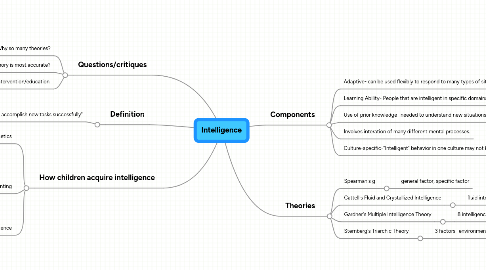Intelligence
da Alexandrya Delgadillo


1. Definition
1.1. "The ability to benefit from experiences and thereby modify future behaviors to accomplish new tasks successfully"
2. How children acquire intelligence
2.1. Genetics
2.1.1. Children with certain defects have lower IQ scores than those nondisabled
2.1.2. Identical twins living appart have similar IQs
2.2. Parenting
2.2.1. Speaking to your child.
2.2.2. Reading to your child.
2.2.3. Playing games, puzzles, activities
2.2.4. Taking them to museums or the zoo
2.3. Experience
2.3.1. Prior experience is constantly used and needed to increase intelligence.
3. Questions/critiques
3.1. Why so many theories?
3.2. Which theory is most accurate?
3.3. Traditional intelligence tests actually designed to determine if a child requires special intervention/education.
4. Components
4.1. Adaptive- can be used flexibly to respond to many types of situations.
4.2. Learning Ability- People that are intelligent in specific domains learn new information faster and easier than people wo are less intelligent in those domains.
4.3. Use of prior knowledge- needed to understand new situations.
4.4. Involves interation of many different mental processes.
4.5. Culture-specific-"Intelligent" behavior in one culture may not be considered "intelligent" behavior in another culture.
5. Theories
5.1. Spearman's g
5.1.1. general factor, specific factor
5.2. Cattell's Fluid and Crystallized Intelligence
5.2.1. fluid intelligence, crystallized intelligence
5.3. Gardner's Multiple Intelligence Theory
5.3.1. 8 intelligences- linguistic, logical-mathematical, spatial, musical, bodily-kinesthetic, interpersonal, intrapersonal, naturalist
5.4. Sternberg's Triarchic Theory
5.4.1. 3 factors- environmental context, prior experiences, cognitive process
